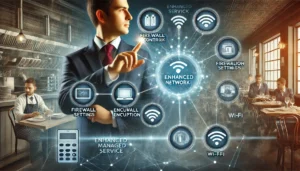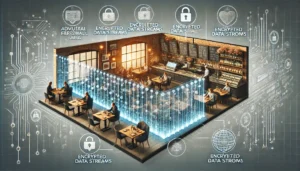Enhancing Restaurant Security: Self-Managed Networks
- Phone: +1(833)PHX-Geek
- 712 H St NE Suite 1904 Washington, D.C. 20002
Are you looking to come to Toast POS? Follow this link to sign up and get a free quote from your local Toast Rep. They will come out to your restaurant, and give you a free, no obligation quote.
Introduction
In an era where digital interactions have become the norm, restaurants are increasingly vulnerable to cyber threats that target sensitive customer information. With the rise of online reservations, digital payments, and loyalty programs, safeguarding customer data is no longer optional; it's essential. Understanding the importance of digital security helps restaurant owners appreciate the need for robust cybersecurity measures tailored to their unique operational challenges.
The restaurant industry, often seen as a low-risk target, has become a prime focus for cybercriminals looking to exploit vulnerabilities in customer data. Data breaches can lead to hefty fines, loss of customer trust, and severe damage to a restaurant's reputation. Consequently, restaurant owners must prioritize security to protect their brand and maintain customer loyalty in an ever-evolving digital landscape.
The shift to digital also necessitates a change in mindset among restaurant owners. They must actively engage in cybersecurity discussions and seek out solutions that not only comply with industry standards but also provide peace of mind. A proactive approach to digital security can be the difference between a successful operation and one that succumbs to cyber threats.
Self-managed networks empower restaurant owners by providing greater control over their data security. Unlike traditional managed services, self-managed networks allow owners to configure their network settings to meet the specific challenges faced by their establishment. This customization is crucial for implementing security measures that align with the unique operational needs of each restaurant.
One of the main advantages of self-managed networks is that they enable the integration of advanced security features that are often overlooked in standard setups. Restaurant owners can tailor their network to include features such as secure guest Wi-Fi, data segmentation, and stringent access controls. These features work together to create a fortress around sensitive customer information, effectively hindering potential cyber threats.
Moreover, self-managed networks grant restaurant owners the flexibility to adapt their security measures as technology evolves. With the increasing sophistication of cyber threats, having the ability to update and enhance security protocols quickly ensures that restaurants stay one step ahead of potential attackers.
To safeguard sensitive customer data, implementing robust security measures such as firewalls and encryption protocols is vital. Firewalls act as a barrier between trusted internal networks and untrusted external sources, filtering incoming and outgoing traffic based on predetermined security rules. For restaurants, this means that unauthorized access attempts can be blocked before they pose a threat to customer information.
Encryption is another critical layer of security that protects data by converting it into a code that can only be deciphered by authorized users. This is especially important for restaurants that collect sensitive payment information. By employing encryption protocols, owners can ensure that even if data is intercepted, it remains secure and unreadable to cybercriminals.
The combination of firewalls and encryption not only enhances security but also fosters customer trust. When customers feel assured that their information is protected, they are more likely to engage with the restaurant's digital offerings, whether that's through online ordering, loyalty programs, or other services. Consequently, investing in these robust security measures is an investment in customer satisfaction and long-term business success.
As the digital landscape continues to evolve, the importance of cybersecurity for restaurants cannot be overstated. Owners must adopt a proactive stance toward their data protection efforts, leveraging self-managed networks and implementing advanced security measures to safeguard sensitive customer information. By prioritizing security, restaurant owners not only protect their business but also build trust and loyalty among their customers.
In the coming years, the need for enhanced security will only grow. Restaurants that successfully navigate this landscape will be those that stay informed about the latest technology trends and invest in the appropriate cybersecurity solutions. As the industry adapts, a strong foundation of cybersecurity will be essential for thriving in the digital world.